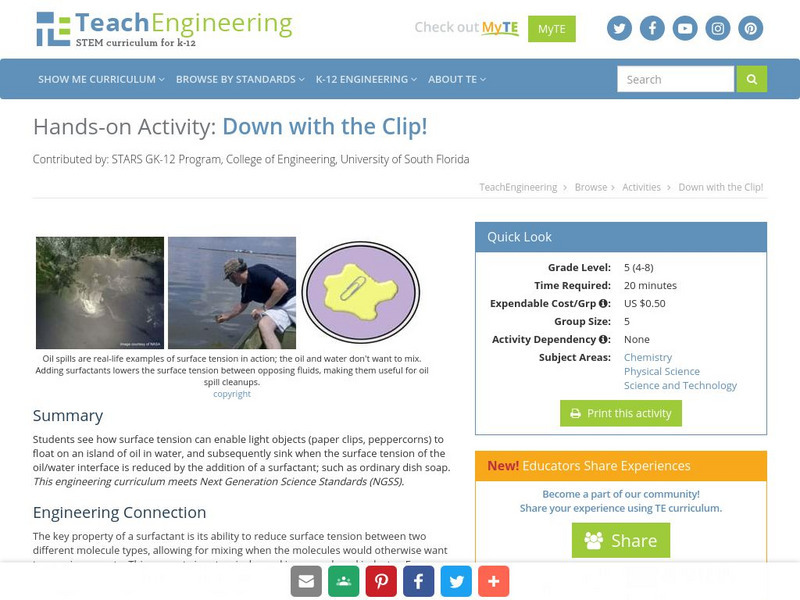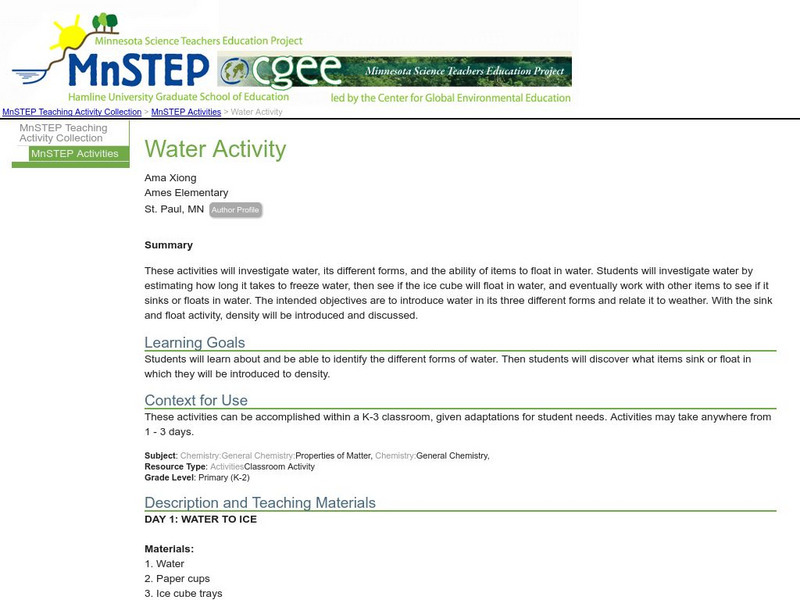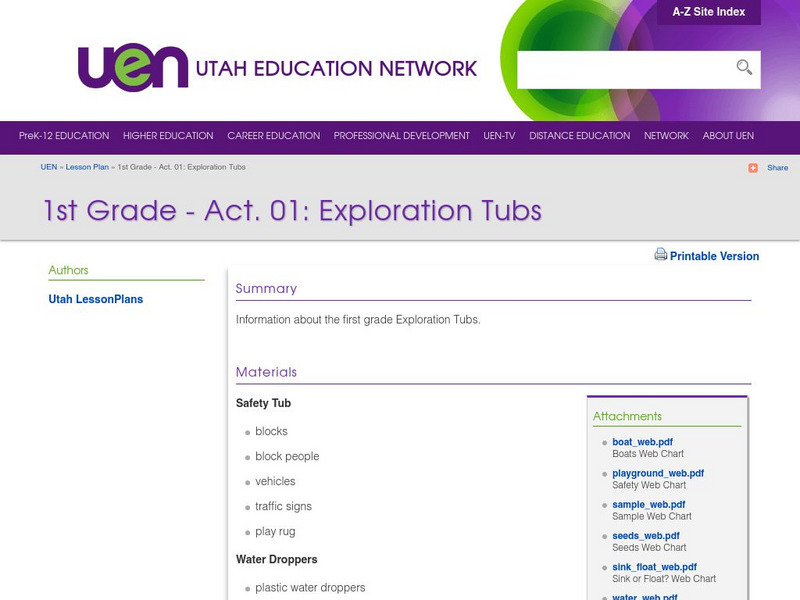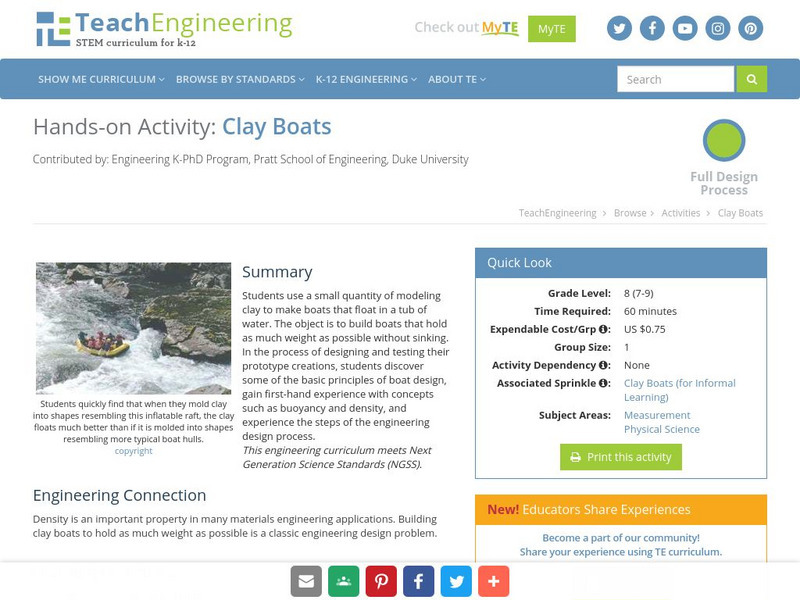Hi, what do you want to do?
PBS
Pbs: Sesame Street: Science
A collection of interactives, videos, and documents on a variety science concepts.
TeachEngineering
Teach Engineering: Down With the Clip!
Students see how surface tension can enable light objects (paper clips, peppercorns) to float on an island of oil in water, and subsequently sink when the surface tension of the oil/water interface is reduced by the addition of a...
PBS
Pbs Teachers: Submarine Race Experiment
Balance the force of gravity with the force of the expanding gasses created by mixing baking soda and vinegar. Create a soda bottle submarine that sinks to the bottom of the bathtub and then rises back to the surface.
Mocomi & Anibrain Digital Technologies
Mocomi: Buoyancy
Ever wonder why/how things float? This concept is called buoyancy. Take this interactive journey to learn and understand how and why certain materials float and others sink to the ocean floor.
Center of Science and Industry
Cosi Columbus: Buoyant Bubble [Pdf]
Learn about density in this hands-on science experiment. Includes full list of materials, procedures, and scientific explanation of what makes an object float or sink. [PDF]
My Science Site
Density Demonstration: Coke vs. Diet Coke [Pdf]
Help students brainstorm and find a solution as to why Diet Coke floats and Coke sinks. Student will learn to define what density is as they engage in this creative lab. This resource is in PDF form; requires Adobe Reader.
Science Education Resource Center at Carleton College
Serc: Water Activity
Students investigate water by estimating how long it takes to freeze, then see if the ice cube will float in water, and eventually work with other items to see if they sink or float in water.
Utah Education Network
Uen: 1st Grade Act. 01: Exploration Tubs
In this lesson, students will investigate different categories related to safety, organisms, sink or float, boats, seeds, and water droppers. Students will use exploration tubs to make observations.
Staten Island Children's Museum
Staten Island Children's Museum: Sea of Boats
Use this activity guide to discover about boats and learn some water science.
PBS
Pbs Teachers: Scientific American: Beneath the Sea: Blowing Ballast
Explore the use of ballast to manipulate buoyancy in submarines by building a model of a submersible using two-liter bottles and balloons. Describe the balance of forces that is responsible for the surfacing and diving of submersibles.
TeachEngineering
Teach Engineering: Clay Boats
Each student uses a small quantity of modeling clay to make a boat that will float in a tub of water. The object is to build a boat that will hold as much weight as possible without sinking. In the process of designing and testing their...
PBS
Pbs Teachers:mysteries of the Deep: Leaky Seal
Investigate the mystery of the sinking of the Confederate submarine Hunley. Explore the mechanics of waterproofing a seal, and compare and contrast the effectiveness of a metal-to-metal seal versus one that uses a rubber gasket.
American Chemical Society
Inquiry in Action: Changing the Density of an Object: Adding Material
In this activity, students see that a can of regular cola sinks while a can of diet cola floats. As a demonstration, bubble wrap is taped to the can of regular cola to make it float. This high-volume but light-weight material increases...
American Chemical Society
Inquiry in Action: Changing the Density of a Liquid: Adding Salt
In this activity, students will see that a carrot slice sinks in fresh water and floats in saltwater. Considering the placement of the carrot slice in water and salt water, students will infer that the density of salt water must be...
American Chemical Society
Inquiry in Action: Defining Density
Do heavy things always sink and light things always float? In this introductory demonstration and activity, students are introduced to the concept of density as they explore a rock and a wooden block in water.
Alabama Learning Exchange
Alex: What's the Matter: A Sinker or Floater?
Students will explore matter that sinks or floats when submerged in water and that matter is categorized as either a sinker or a floater. Students will work actively in small, cooperative learning groups as well as gather in a whole...
CK-12 Foundation
Ck 12: Chemistry Simulation: Going Fishing
[Free Registration/Login Required] Students will be able to change the mass and volume of an item and observe if it floats, sinks, or remains at a certain depth in the water. Students will also be able to change the liquid in level 2.
Other popular searches
- Sinking and Floating
- Floating and Sinking Objects
- Science Floating and Sinking
- Free Floating and Sinking
- Floating and Sinking Water
- Floating and Sinking Inquiry

















